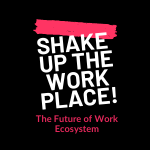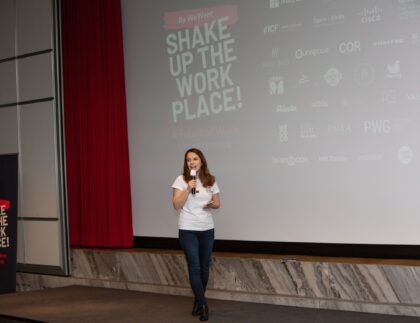
Toxic work environment - why is it only half of the burnout equation?
Spoiler alert: I am not joining the crowd that beats the drum: “let’s blame employers for burnout”. Without validating hostile work cultures, I dare to say: it is just half of the story. Let me tell you the other half.
First things first:
Do I have burnout or am I just lazy as my boss/spouse/mother-in-law/colleagues tell me?
For over twenty years I have worked with people who experienced burnout on both sides of the fence: arm in arm in the corporate world as an HR professional and eye to eye as their therapist. So I can tell you one thing:
I haven’t met a lazy or permanently disengaged person who would burn out.
You need to be on fire first!
So, am I burned out if I am exhausted and hate my job?
It is stressful to be in a role you really don’t enjoy.
It is emotionally distressing to have a boss who is a jerk.
And it sucks to have colleagues who are selfish, overly political, and annoying.
It impacts our health if we’re asked to work beyond our human limits for a long period.
But following the most commonly used definition, crafted by Christina Maslach & Michael Leiter, to be diagnosed with burnout, you need to experience three dimensions concurrently:
- Exhaustion which can be physical (I can’t get up from bed), emotional (I feel like crying for any reason, or I feel emotionally shut down, nothing brings me joy these days), or intellectual (I feel as if I had a mental fog, I forget things, I’m not on the top of my calendar as I used to be).
- Negativity (“stinking thinking” = if you think the word stinks you will smell poo everywhere;) or cynicism (you try to keep yourself social but your sense of humor is pure sarcasm).
- Professional inefficacy, which sometimes is an actual drop in your performance, but often is your own perception (I can’t keep all the balls up in the air, I don’t deliver up to my standards) whilst others don’t notice the difference.
If this is your reality, your body is trying to send you a message. Listen to it.
What can cause burnout in the workplace?
Extensive research conducted by burnout experts Christina Maslach, PhD Psychology, University of California, Berkeley & Michael Leiter, PhD Psychology, Deakin University in 2008, identified 6 elements of the workplace environment that can trigger a burnout response:
Burnout trigger 1: Overload
The occasional emergency of the extra workload is a norm in most workplaces these days, however, when overload becomes a chronic job condition, it leads to exhaustion.
Burnout trigger 2: Community
Not satisfying relationships at work, poor leadership, conflicted team, lack of trust & support, too much politics drag our engagement down.
Burnout trigger 3: Control
Perception of lack of control and influence over own work drains energy and drives disengagement.
Burnout trigger 4: Insufficient reward
Inadequate financial, institutional, or social reward (i.e. lack of recognition from colleagues, managers, or external stakeholders) doesn’t make us feel valued.
Burnout trigger 5: Values
When our individual values don’t match organizational ones, we realize we trade ourselves off. And it’s a bitter realization.
Burnout trigger 6: Fairness
The most predictive burnout factor from all six. If we feel that our work is not fair and equitable, if we perceive we give more in (like time, effort, and expertise) and receive less back (in terms of rewards, recognition, advancement) we are on the slippery slope to burnout.
Question: Are these factors reality just for some people and not the others in the same organization?
Seriously if only selected individuals are constantly overloaded, more pressured, undervalued, alienated, mobbed, and discriminated against than the vast majority then obviously there’s a big problem in the organization and potentially a legal case on the way.
But most companies nowadays effectively prevent that from happening. If there’s poor leadership it radiates pretty much equally on all employees; if there’s year-end entire finance team works crazy hours etc.
I dare to say if you’ve worked in a corporate environment for a few years, none of these are really foreign to you, are they? We have all experienced all of these, haven’t we?
If these factors were the sole cause of burnout, all people experiencing the same working conditions be affected, wouldn’t they?
They don’t.
There must be some individual factors making some people predisposed more than others.
Why do I burn out then?
Always Great. Never good enough.
Gerard came to me exhausted, bitter, disappointed, angry at his boss, and frustrated with stakeholders.
He had sleeping problems, headaches, nausea, started to cheer himself up with a glass of wine every night and worried about his future (health, career, family).
A very well-educated, multilingual, and incredibly successful Internal Audit Director in a big multinational. He always delivers in his job and is regarded as a great talent. Despite working his hands to the bones and being constantly praised he was turned down each time he applied for a new role. He felt betrayed.
We could argue, it’s a classic case of burnout caused by a toxic workplace: overload, insufficient reward, lack of support, conflict of values and perceived injustice.
But there was one more reason Gerard sought help now: he experienced burnout for the fourth time in his impressive career.
Is toxic environment so common these days or was Gerard so unlucky?
“What’s wrong with me?”
Gerard’s story from the therapist’s couch
If you think therapists talk about working with people who experience burnout, you’re far from the truth
Please note Gerard’s story is just an example. However, the conclusions I am sharing are universal for the vast majority of people who experience burnout.
“I had a good childhood.” That’s how it usually starts... Gerard lived in a small town with both parents, an older brother and a little sister. Middle-class working parents, no addiction or acts of violence in the family. Typical for the times, he had a bit of a cold father who believed his role was to toughen the boys and a warm loving mother, who dreamt about a better future for her kids. She used to encourage her children to study hard, be the best they can be, and she applauded their educational successes.
Not bad at all; many kids are less lucky with their parents.
Small detail: Gerard’s older brother, Thomas, was a troublesome kid. He got involved in fights, skipped school now and then, lied too much, and kept his mom worried. She was very busy with a baby girl and did not have enough time to keep a close eye on boys. She often cried, worried about Davis’s future. She used Gerard as a role model, hoping Thomas would follow his example and get better at school. It didn’t work.
Gerard suffered seeing his beloved mom in pain and crying. He was a good son; he always was the best student; he always made her proud. Yet, no matter how much he tried, he couldn’t wipe off his mom's tears. He couldn’t compensate for his older brother’s troubles, but he tried. Harder every day.
At the same time, Gerard’ father didn’t seem to recognize and appreciate Gerard’s efforts and academic achievements. “It would be better for you if you played football with other guys more often”, he commented.
Again, not really a drama. No trauma, no abuse, no sensation.
But it is not the drama that matters. What matters are thoughts and beliefs that a few-year-old Gerard has formed by living this life day in and out:
- I need to work hard, give it all and be the best as it is the only way to make my mom proud and happy for a while.
- No matter how hard I try and how good I am (winning school competitions or academic achievements), I can’t take the suffering away from my mom.
- No matter how hard I try and how good I am, I can’t make my dad proud, and hear “you are a great boy, you are a great son, I am proud of you, I love you”.
- All that must mean “I am not good enough. I am not good enough to make my mom happy. I am not good enough to make my dad proud. I am not good enough to deserve my dad’s love and affection and be accepted the way I am. I am not good enough. I must try harder.”
These were not conscious conversations Gerard had with himself. These were unquestionable facts, the only reasonable explanations formed by the young boy growing up with such a daily experience.
And with such a “program” Gerard goes through what looks like a very successful life. He studies more and more, works harder and harder, proves himself more and more, yet… still does not feel he is good enough. Working his butt off to deserve recognition, attention, promotion. Dreaming of having a more balanced life yet depriving himself of it, hoping that somebody (his boss, his team, organization) would fill the empty space in his heart. Tough. Organizations are not good at, and not really meant to be filling gaps in hearts.
Understanding is power.
Whether we like it or not, we are all driven by emotions, often suppressed emotions, fears and insecurities. For some of us, it includes unresolved trauma. For many deep unconscious beliefs, we don’t even notice as they are unquestionable truths, the air we all breathe and don’t notice most of the time.
Will I ever recover from burnout?
You will if you accept the fact that what you can control is not outside of you.
If you are willing to look inside yourself and determined to detangle your personal story you can heal within a few weeks.
A good therapist will help you identify the destructive thought patterns, see, hear, and feel the feeling that was not seen, heard and felt for too long, heal and rewire your brain for a better future.
How long will it last?
The good: if you find the right therapist, coach, healer, or magician – it’s a matter of few weeks.
The bad: if you decide to quit your job and start somewhere else (change one half of the equation), but do not resolve your personal issues (leave the other half untouched), you usually feel better for months or even years. It’s not unusual though that you will find yourself in similar circumstances when the honeymoon is over...
The ugly: If you choose to do nothing: neither work on yourself nor address the workplace, you are likely to slip down into depression.
Don’t choose “the ugly”. It feels really ugly.
If it’s half organizational and half personal, should HR, bosses, and organizations really care?
Or knowing that half of the problem is on the individual’s side, should we turn a blind eye and let people find their ways out (of their condition or of their jobs)?
Well, it’s good to remember that the same “program” that our minds run on, the program that makes us susceptible to burnout is exactly the same program that makes us extremely good at pushing ourselves, striving to become better, delivering, achieving and engaging in what we do.
- A program that makes us work extra hours, go the extra mile, and work our fingers to the bone.
- A program that makes us genuinely care about our work and the organization we work for.
- A program that makes us tireless workers and dream members of each team.
It makes complete sense for the entire organization to care about smart, ambitious, hardworking, dedicated high performers.
Even if the job itself is not the leading cause of burnout, it does act as a trigger. We know it means it is far from an ideal work environment for most of your co-workers.
Think about Olympic athletes. Be sure they are not immune to burnout, depression, or anxiety.
On the contrary, they are on the extreme end of the program that makes them stay extremely disciplined usually since childhood, the program that makes them choose to sacrifice (often on a strict diet, restricted social life, no holidays as we know it, limited (or no) time for hobby etc.), the program that makes them practice their art day in and day out, even if it hurts, the program that makes them excel.
Nobody turns a blind eye to mental health challenges among Olympic athletes. On the contrary. Top sports teams and individuals are constantly supported and receive help from coaches, doctors, psychologists, physiotherapists, dietitians, etc.
Nobody turns a blind eye to the mental health issues of high performers because they are the driving force behind the victories of entire teams, organizations, and countries.
Why would we?
So, what to do?
First and foremost, I disagree that it is “HR’ that is responsible for preventing and tackling burnout in organizations.
I believe we all play a role in making our workplaces healthier and better, or more daunting and draining. It’s not just HR or “the leaders” who should realize what’s wrong and correct.
We all are.
We are all adults.
Each of us as an employee has a voice and a choice.
To do or not to do.
Therefore, I’d argue, every employee should take ownership and react when they see things are not right. We should not wait until things go out of control. We need to start tackling problems in our work environment when we cope with them. Because when we stop coping, when we experience burnout or other mental health struggles it feels impossible and hopeless.
Each of us can help detoxify our organizations, address questionable practices and atrocious behaviors, and help lousy leaders step up or move.
Each of us can help make our organizations become more robust, more transparent, more friendly, fairer, and better.
Each of us can and should.
This is “leadership courage”.
How can HR help those who are already “in the hole”?
There are some amazing companies that offer complex support for both organizations and individuals in the space of mental health and wellbeing. From education and prevention to personalized solutions for individuals in need.
Show that you genuinely care about the wellbeing of your people by offering them contact with experts who have the right tools, processes, and experience to move them out of pain to glory again. Just as you offer the best performance coaches to your high potentials.
Show that you genuinely care about your people.
Not your “greatest asset”, but engaged, damn good, hard-working people.
The driving force behind the victories of your team and your organization.
Your Olympic athletes...
To get even more deep-dive content such as this, join our SHAKE UP THE WORKPLACE COMMUNITY as a FREE member today
On this page, you will also find more info about our other membership tiers and how they help you take action toward your desired Future of Work.
About our Thought Provoker: Lucyna Milanowska is a Psychologist, Certified Rapid Transformational Therapist®, Global HR Talent & Development Director and the owner of of UNFEAR®. She guides corporate leaders from burnout and anxiety to strength and ultimate confidence.












